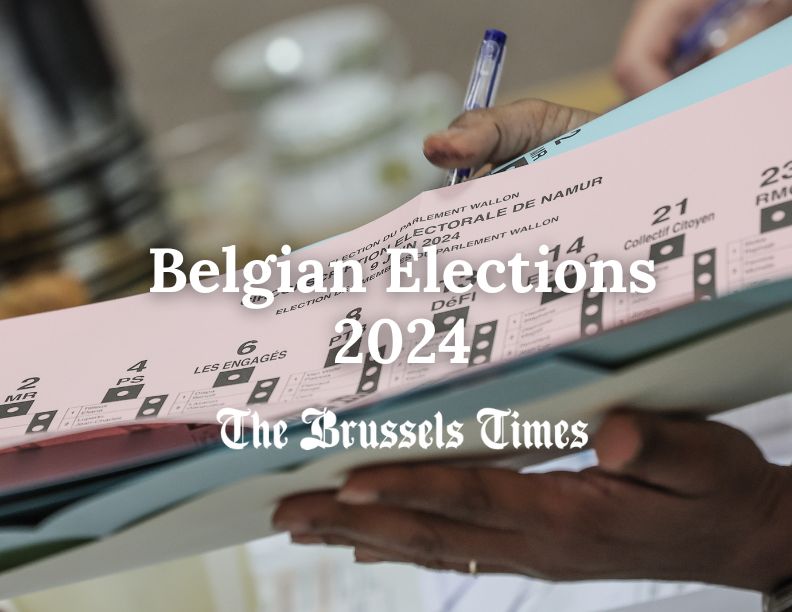This article covers the developments of Monday 10 June. Those who want to read The Brussels Times' play-by-play coverage of election Sunday can find yesterday's live blog here.
Good afternoon from Brussels! All votes have been counted after an eventful election day, and the Belgian political landscape is in for quite the shake-up as the different party leaders will start trying to form the country's various governments. The Brussels Times brings you the latest updates.
More than 8.35 million people in Belgium were called to polling stations on Sunday 9 June, casting votes in the federal, regional and European elections. Among the voters were 244,000 16- and 17-year-olds, who could vote for the first time in the European elections. The day concluded with speeches from the party leaders of the day's biggest winners (and losers).
As all results from across the country are in, the government formation process can start. Read all about how this works with Belgium's complex state structure in this article.
Follow the most important developments here. The latest updates appear highest on the page.
[18:45] – Explorative government formation talks continue tomorrow
King Philippe will continue consultations for Federal Government formation on Tuesday and Wednesday. Tomorrow, PS president Paul Magnette will be heard at 09:15. Following this, the presidents Raoul Hedebouw (PTB), Maxime Prévot (Les Engagés), Melissa Depraetere (Vooruit), Sammy Mahdi (CD&V) and Tom Ongena (Open VLD) will be expected at the Palace.
With that, we will be wrapping up today’s live blog. Thanks to all!
[18:39] – MR leader believes Federal Government could be formed soon
The leader of the MR party Georges-Louis Bouchez was received by the King on Monday for approximately 40 minutes, bolstering the potential for swift formation of a Federal Government.
Bouchez said he had no vetoes to place on any democratic partner. "We do not need to wait weeks to establish a party constellation. Everything could ensue swiftly. We are envisioning weeks, not months. There are coalitions easier to establish than others. PS's decision to sit in opposition points to an easier constellation."
He added that the goal is to "begin negotiations within the coming hours. We aim to use the mandate for reforms, following the decisive voting of Belgians."
[18:30] – MR will only have 19 seats in Federal Parliament, not 20
Outgoing Secretary of State Alexia Bertrand confirmed she will be taking the oath in Dutch after being elected in Brussels on an MR-Open VLD ticket, according to a spokesperson. Bertrand joined Open VLD in late 2022, after serving for the MR in the Brussels Parliament, resulting in eight seats for the party, rather than seven.
Ecolo faces a similar situation: Federal Minister Tinne Van der Straeten, elected in Brussels on a joint Ecolo-Groen list, will also take her oath in Dutch. However, the impact differs as Ecolo and Groen form a joint group in the Federal Parliament.
[18:20] – De Wever will invite Flemish parties from Tuesday afternoon
With a view to forming the Flemish Government, N-VA leader Bart De Wever will receive the six other party leaders in the coming days, starting with the biggest one and working his way down.
On Tuesday afternoon, De Wever will start with four leaders for a 45-minute conversation each: Tom Van Grieken from Vlaams Belang will be the first to be received, followed by Vooruit's Melissa Depraetere and CD&V's Sammy Mahdi.
There will be discussions with the co-leaders of Groen, as well as the leader of PVDA on Wednesday. It is not yet clear whether an invitation will also go to Fouad Ahidar, who single-handedly managed to claim a seat in the Flemish Parliament.
[18:01] - What possible coalitions can be formed?
Now that all votes have been counted, the arduous task of forming a government lies ahead. But what partnerships could form Belgium's next governments? Read the full article here.
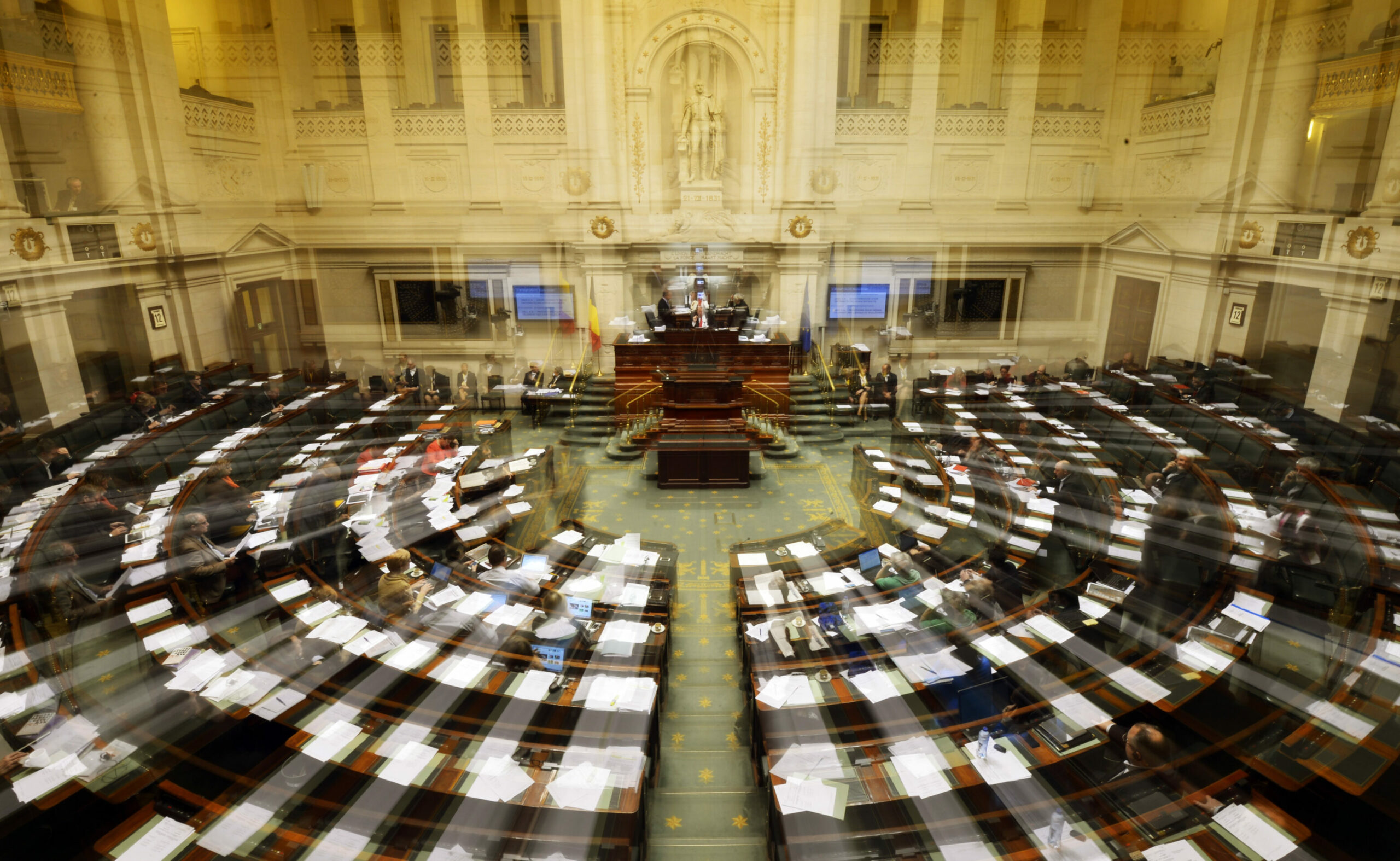
Penary session of the Chamber at the federal parliament, in Brussels. Credit: Belga / Benoit Doppagne
[17:39] – King will continue consultation rounds on Tuesday and Wednesday
Following talks with N-VA leader Bart De Wever, Vlaams Belang leader Tom Van Grieken and MR leader Georges-Louis Bouchez, Belgian King Philippe will continue his consultations with a view to the formation of the next Federal Government on Tuesday and Wednesday.
On Tuesday at 09:15, the leader of the Francophone socialist PS leader Paul Magnette will be invited. Afterwards, Raoul Hedebouw (PTB-PVDA), Maxime Prévot (Les Engagés), Melissa Depraetere (Vooruit), Sammy Mahdi (CD&V) and Tom Ongena (Open VLD) will successively visit the Palace in Brussels.
Green co-chairs Jeremie Vaneeckhout and Nadia Naji are expected on Wednesday from 09:30. Afterwards, it is the turn of their colleagues from Ecolo, Jean-Marc Nollet and Rajae Maouane, and DéFI leader François De Smet.
It is customary for the King to hold a consultation round after the elections, in which he usually speaks with the leader of the biggest party first and works his way down.
[17:23] – Some young voters "disappointed" about election result
After a busy election day, The Brussels Times talked to young voters who went to the polls yesterday in Brussels.
Amélie, who is in her 20s, voted for Ecolo "at all three levels of power." She said her vote was mainly driven by her concerns about "the climate crisis and social inequalities." With the victory of MR, she is now worried, as "the climate issue is not the party’s priority." According to her, "people are mistaken" and too many are "sceptical about the climate issue."
For Malika, like her friends, her vote was to "counter the far right." She voted for Ecolo and two other left-wing parties. Talking about the scores of right-wing and far-right parties, she is "very disappointed by the scores and by the fact that the right is still in power, more than ever."
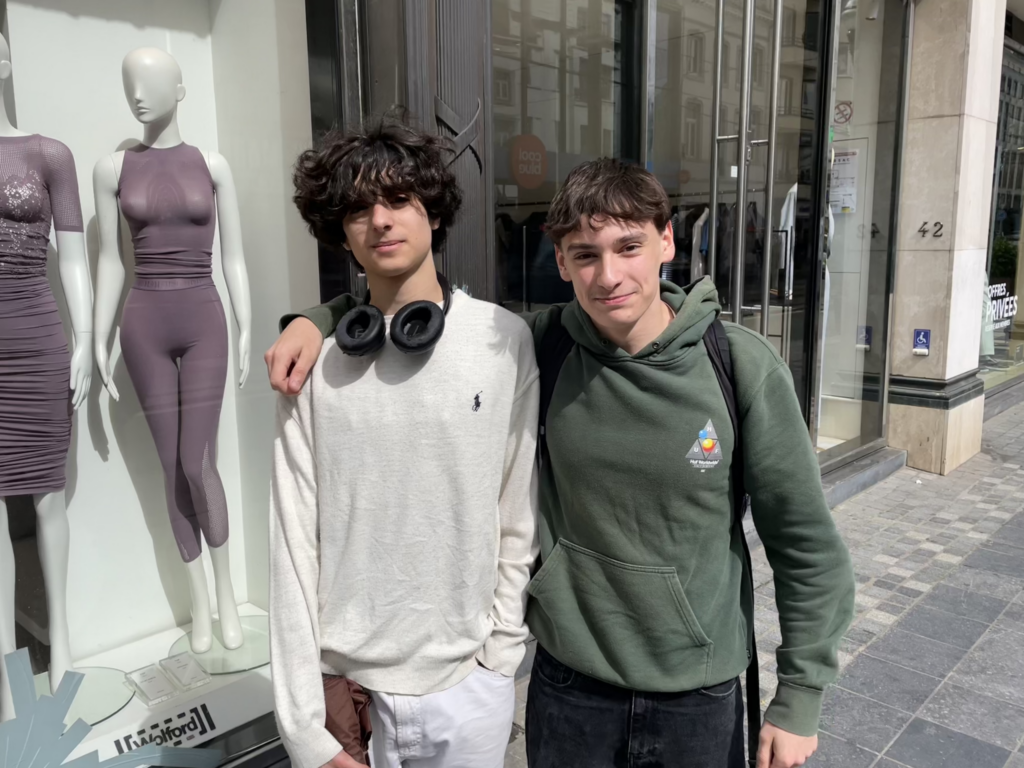
Ethane and Roméo, not yet 18, voted for the first time on Sunday. Credit: The Brussels Times / Thimoté Bozzetto
Ethane and Roméo, who are not yet 18 and voted for the first time, said their main concerns were "to change things, especially with inflation and prices rising far too fast." While under-18s were only supposed to vote for the European elections, Roméo claims he voted twice – one for Les Engagés and the other for PTB-PVDA. His friend Ethane, after taking a voting test, says he voted for DéFI. Both are "slightly disappointed." They say they "don't share MR's opinions and values."
[17:10] - Who were the most popular politicians?
The politicians with the most referential votes during Sunday's elections have been revealed. N-VA president Bart De Wever received 255,446 preferential votes in the Federal elections (people voting specifically for him rather than the N-VA "list") making him the most popular politician, vote-wise (or as the Flemish say, he is the "vote canon").
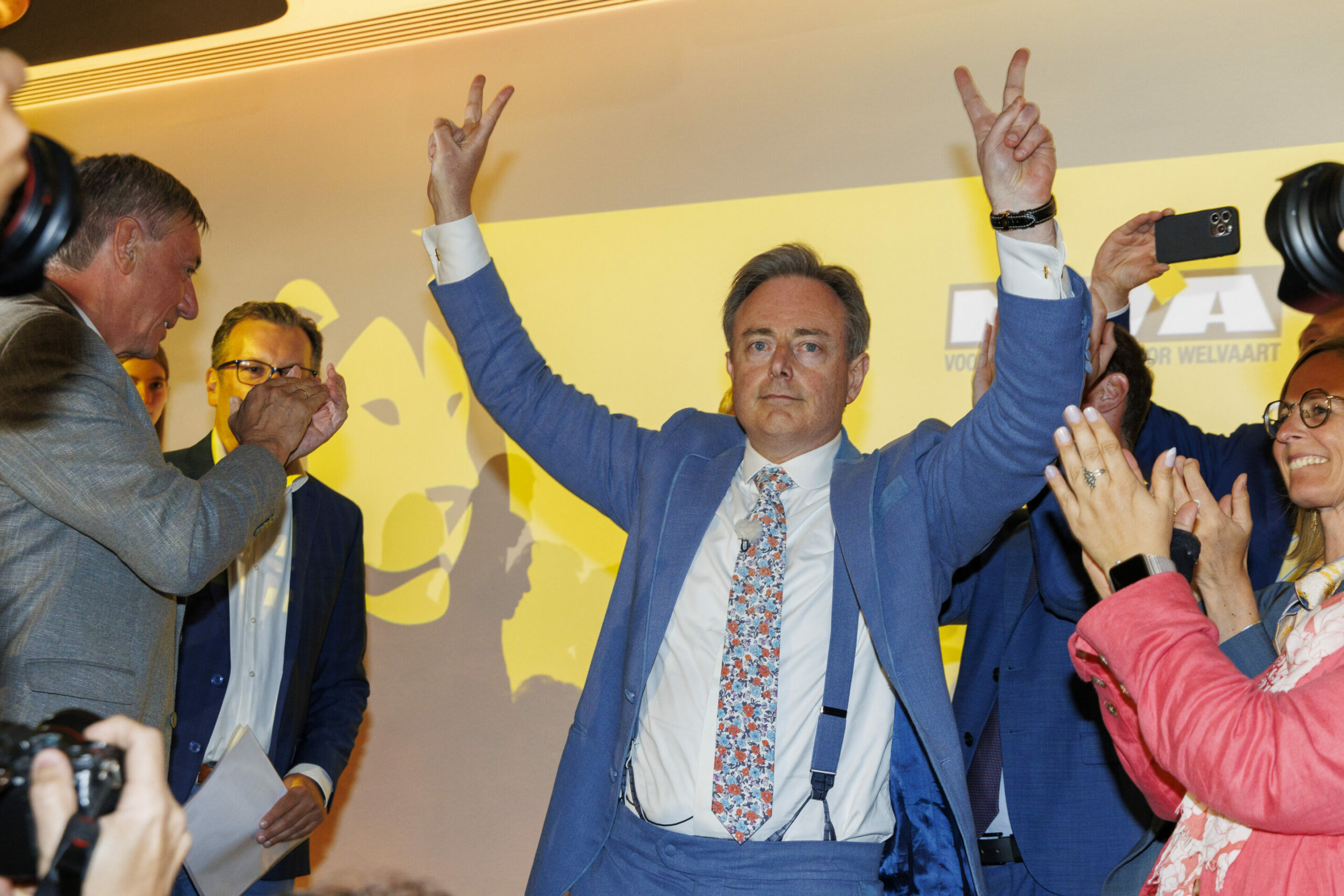
N-VA chair Bart De Wever. Creidt: Belga/ Nicolas Maeterlinck
In second place is PS leader Paul Magnette with 90,198 preference votes, followed by MR leader Georges-Louis Bouchez. This shows that contrary to the overall result, the Socialist Party president did better than his Liberal colleague when it came to individual votes for a particular politician.
Theo Francken (N-VA) follows in fourth place with 73,820 preferential votes. He is followed by outgoing Home Affairs Minister Annelies Verlinden of CD&V, who garnered 65,307 votes.
[16:53] - PS leader Paul Magnette submits resignation, but party refuses
Leader of the French-speaking socialist party PS Paul Magnette submitted his resignation as party president after it suffered historic losses in Sunday's elections, however, the leadership has unanimously refused his resignation. The board stressed PS should continue to move forward and continue its commitment to the local level.
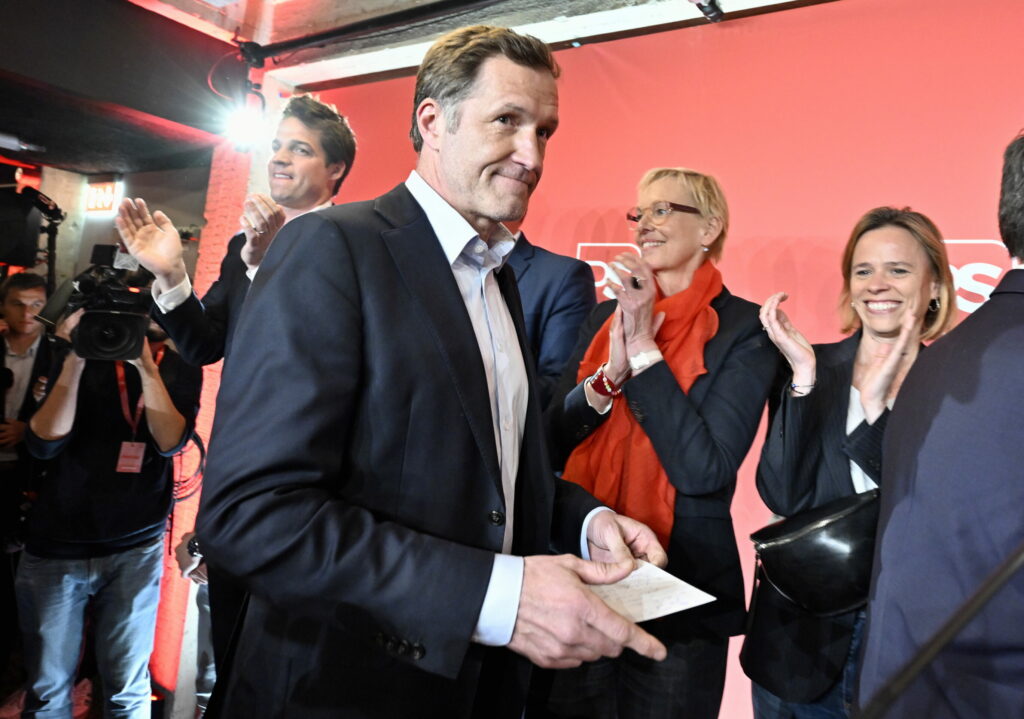
PS chairman Paul Magnette pictured at the post-election meeting of French-speaking socialist party PS. Credit: Belga/Eric Lalmand
In Wallonia, the PS – which was the largest party in Wallonia in 2019 – lost more than 3% of the vote to now land in second place with 23.22%. Now, the Francophone liberal MR leads the Walloon parliament, putting the party ahead of PS for the first time.
The board announced that the party will opt to be in the opposition at all levels. "We have to respect the voter's choice," Magnette said. "It is logical for us to go into opposition since there is a wave to the right and the MR and Les Engagés won the elections." In the Walloon Government, this likely means a coalition will be formed with French-speaking liberals MR and the Christian Democrats Les Engagés.
[15:17] - PTB-PVDA chair Raoul Hedebouw to visit King on Tuesday
The president of the Belgian Workers Party Raoul Hedebouw PTB /PVDA confirmed he has been invited to visit King Philippe on Tuesday morning. Hedebouw noted that he is being invited relatively quickly because his party, which is the only one to stand across the entire country, was one of the big winners in Sunday's elections, especially in Flanders where it gained five seats and in Brussels where it gained six.
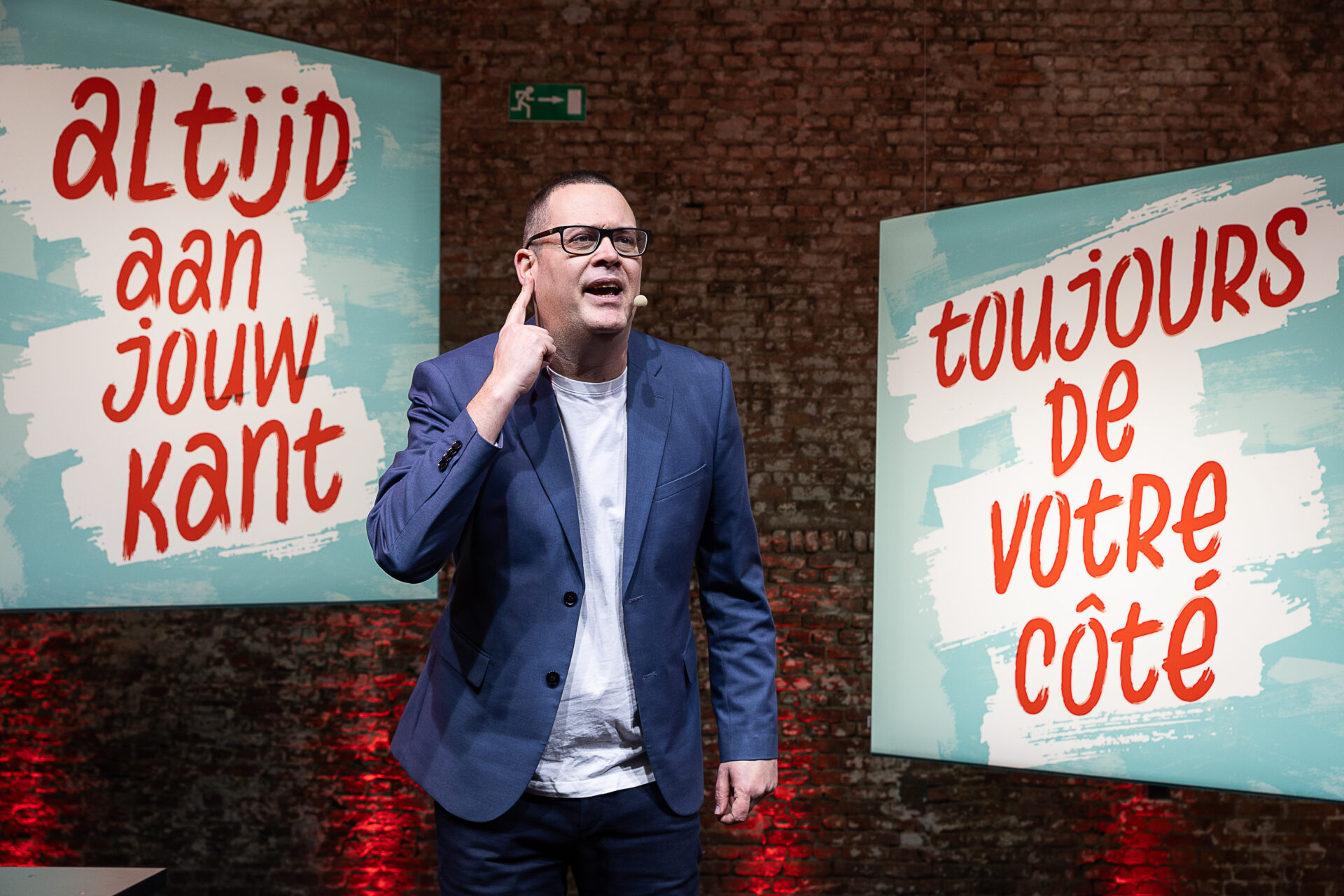
Belgium Worker's Party (PTB-PVDA) leader Raoul Hedebouw at the party's New Year reception on Sunday 14 January. Credit: Belga / James Arthur
On Monday afternoon, royal consultation rounds start with the first set of party leaders, including N-VA leader Bart De Wever, Vlaams Belang leader Tom Van Grieken and MR leader Georges-Louis Bouchez, the leaders of the three parties that came out on top in Sunday's elections.
[14:30] - Chair of French-speaking party Défi resigns
François De Smet, the chair of Défi, a small party based mainly in Brussels and defending the rights of French speakers, has announced he is resigning after his party suffered heavy losses during the elections on Sunday.
In the Walloon Parliament, the party finishes at 2.7%, down by 1.44% since 2019. With 1.2% of the votes at the federal level, the party also failed to reach the electoral threshold. In Brussels, Défi clocked in at 8.1%, going from 10 to six seats in the Brussels parliament.
[13:51] - No indication of significant problems after voting incidents
The issues experienced by some voters on Sunday – several 16- and 17-year-olds said they were also able to vote on the Flemish and federal lists, while they are only eligible to vote in the European Parliament – did not cause significant problems, the Home Affairs Department confirmed on Monday. There were also reports of EU citizens voting for the European Parliament being able to vote on the Flemish and federal lists.
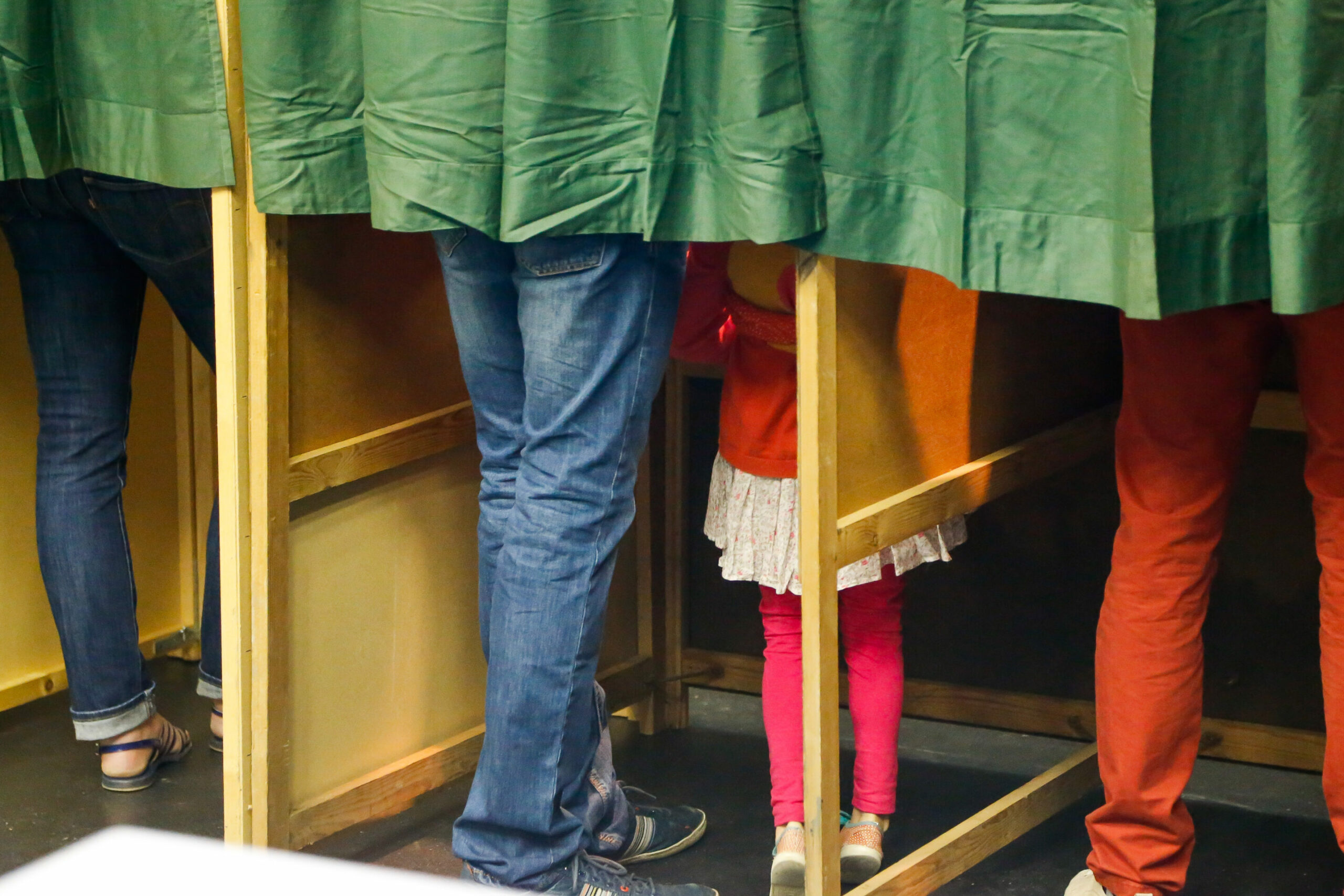
Credit: Belga / Bruno Fahy
The Ministry said it has looked at the figures on the number of votes per main counting office and there is no sign of significant differences, confirming that the issue was caused by human errors in polling stations rather than being down to a problem with the system. However, it said it would continue to follow up on possible problems.
[13:17] – 'Information round has begun' for Flemish Government, says De Wever
N-VA leader Bart De Wever's round of information to form a Flemish Government has already started. "I have already sent messages and made phone calls last night," De Wever said after the party board meeting on Monday morning. For physical meetings with fellow leaders, it may still be too early.
Since N-VA emerged as the largest, the party has the right of initiative, but De Wever does not yet want to reveal more information. "We agreed that it is better not to make too many statements." Over the next few days, as usual, physical talks with other leaders will take place.
[12:34] – Entire party leadership Open VLD resigns
The entire party leadership of the Flemish liberal Open VLD is resigning, following its historic election defeat, resigning party leader Tom Ongena told Belga News Agency on Monday morning.
"The entire party is collectively taking responsibility. We want a new leader and a new board. The aim is to finish that by the end of summer," he said.
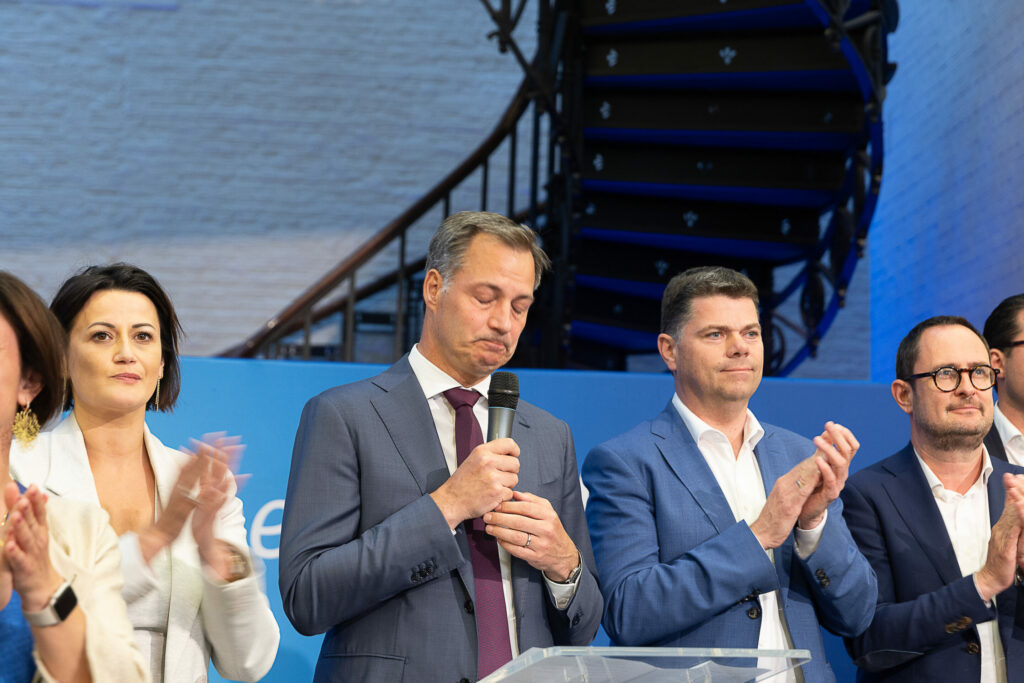
Open VLD's Stephanie D'Hose, Alexander De Croo, leader Tom Ongena and Vincent Van Quickenborne. Credit: Belga/James Arthur Gekiere
Ongena also reiterated that Open VLD is "not a candidate for government participation." Last night, he had already announced he was no longer a candidate to succeed himself as party leader. Elections for a new president were initially scheduled only after the municipal elections, but will now take place sooner.
[12:19] – Never before have so many Brussels residents voted for a Dutch-language list
No fewer than 80,379 Brussels residents ended up voting for the Dutch language group in the Brussels Parliament. It also means that the Dutch-language lists never before accounted for such a large share of the total: 17.1% (compared to the 15.3% from 2019).
As was the case five years ago, a factor is likely that many voters who do not speak Dutch at home still chose a Dutch-language list. This certainly seems to be the case for the revelation of these elections in the Dutch-language group: Team Fouad Ahidar, who managed to convince over 12,000 voters – good for three of the 17 Dutch-language seats.
The growth of the Dutch-speaking community in Brussels may also be playing a role: the number of voters with a Dutch-speaking address (and identity card) has risen sharply over the past five years, with experts pointing to a growing number of young Flemish people settling in Brussels.
A final factor of interest might be the way electoral lists have been displayed since 2019: voters are shown all Brussels lists at a glance, making the step to a party from the other language group much smaller.
[11:52] – Prime Minister De Croo arrived at the Palace
Prime Minister Alexander De Croo (Open VLD) arrived at the Royal Palace around 11:30, where he will announce the resignation of his government. The day after the elections, the resigning Prime Minister is the first to be received by the King to officially announce the resignation of his government, after which it goes into managing ongoing affairs.
Upon arrival by car, De Croo did not say anything but did wave briefly to the press. After De Croo, the King will hold meetings with the presidents of the House and Senate.
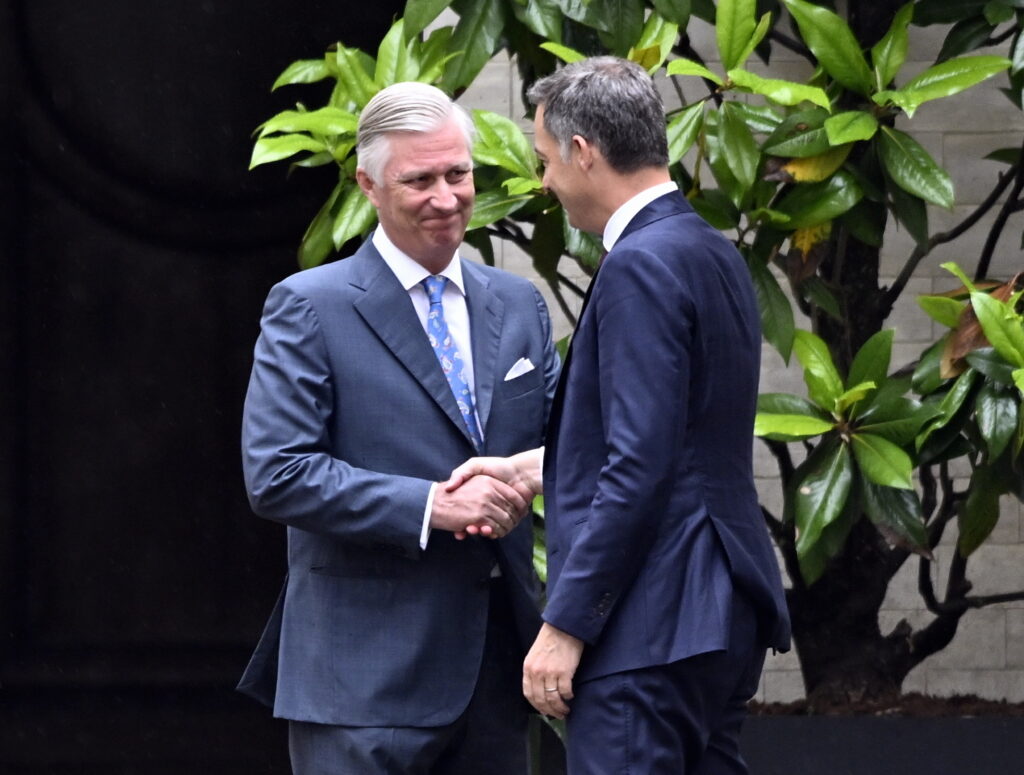
King Philippe welcomes Prime Minister Alexander De Croo the day after the elections. Credit: Belga/Eric Lalmand
In the afternoon, royal consultation rounds start with a first set of party leaders. From 14:30, N-VA leader Bart De Wever, Vlaams Belang leader Tom Van Grieken and MR leader Georges-Louis Bouchez will be received successively.
[11:48] – MR leader Georges-Louis Bouchez hails 'clear choice' for centre-right
The leader of the liberal MR party Georges-Louis Bouchez emerged victorious from the polls on Sunday, and welcomed the voters' "very clear choice" for the centre-right. "We were able to propose the reforms that our fellow citizens need," he told Bel RTL.
"The left has clearly been punished," he pointed out. All the left-wing parties have regressed, and there has been a clear fall in Wallonia, which is "historic" for the PS, the MR leader said. "Whether it's us or Les Engagés, it's a very clear choice for the centre-right."
Asked about his objectives for the forthcoming government negotiations, Bouchez stressed that he was "not excluding anyone" and that everyone should be listened to. "But the first person you have to listen to is the voter."
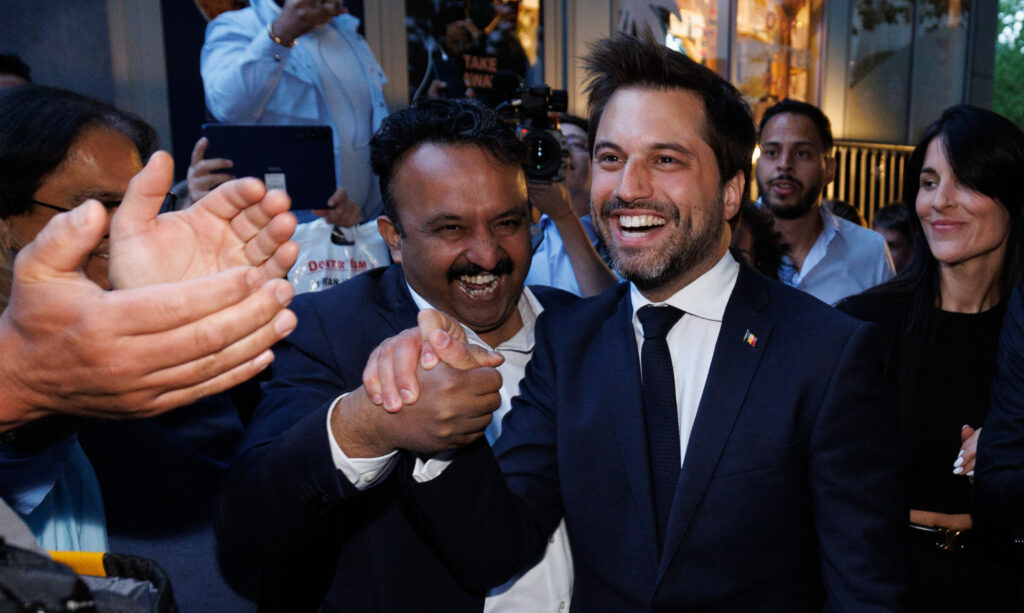
MR leader Georges-Louis Bouchez pictured during the post-election meeting of French-speaking liberal party MR. Credit: Belga/Benoit Doppagne
As for a rapprochement with the Flemish N-VA of Bart De Wever – whose party is victorious in Flanders – he noted that there are many "similarities" between MR and N-VA, particularly in terms of security and immigration.
While the two parties "have the right of initiative" on either side of the language border, Bouchez pointed out that at the Federal level, it is first up to the King to initiate royal consultations and appoint an informator.
[11:32] – N-VA gained some 40,000 votes in Wallonia, but no single seat
N-VA – which filed lists in Wallonia for the first time – attracted some 40,000 voters on Sunday, although not enough to win a seat. Bart De Wever's party won the most Walloon voters (14,184) in Hainaut, ahead of Liège (10,840), Walloon Brabant (5,753), Namur (5,526) and Luxembourg (4,413).
Formerly close to the MR, Drieu Godfridi became the face of the N-VA party in Wallonia but received only 1,150 votes in Walloon Brabant, where he was a candidate. Although the N-VA failed to win an elected member in the south of the country, the 40,000 voters it won over there should boost its endowment a little further.
[11:14] – De Wever is expected at the Palace this afternoon
N-VA leader Bart De Wever has been invited to the Palace as early as 14:30 to discuss the election results with King Philippe, De Standaard reports. This signals the start of the King's round of consultations with the party leaders, kickstarting the (possibly very long) process of forming a Federal Government.
After speaking to the party leaders, the King will appoint an informator to lead the formation talks. Given that De Wever's party came out on top, honour/task will likely fall to him. More information on how the entire process works can be found here.
[10:45] – Jean-Marc Nollet and Rajae Maouane quit as Ecolo co-leaders
Jean-Marc Nollet and Rajae Maouane are stepping down as co-leaders of the Francophone environmentalist Ecolo after the party's electoral defeat on Sunday, Nollet announced on Monday morning.
"We will not stand again as candidates. A page is being turned. A new generation will take responsibility," he said. "Political ecology is needed more than ever. We were the only ones putting forward problems and a vision for society, but I always took responsibility, even when things went wrong."
Explaining his party's defeat, Nollet cited an "offensive" against the Greens, saying that their programme was often caricatured, especially on social media. "We have been labelled dogmatic." Yet, he stressed, climate action is necessary, at a time when 2023 was "the warmest year in 100,000 years" and biodiversity is under pressure.
[10:06] – No Vlaams Belang-N-VA majority in Flemish Parliament
After counting all the votes, both the Flemish far-right Vlaams Belang and the Flemish right-wing N-VA have 31 seats – totalling 62, which falls one seat short of the required majority (63) in the 124-seat Flemish Parliament. In terms of coalitions, this means that a majority in the Flemish Government by the N-VA and Vlaams Belang is out of the question.
If the cordon sanitaire is not broken (no democratic party aligns with far-right politics), the most likely possibility for a three-party government would be N-VA, socialist Vooruit, and CD&V. However, this coalition would have a precarious hold on power with just 65 seats. If it expanded to include Groen or Open VLD, the coalition would have broader footing.
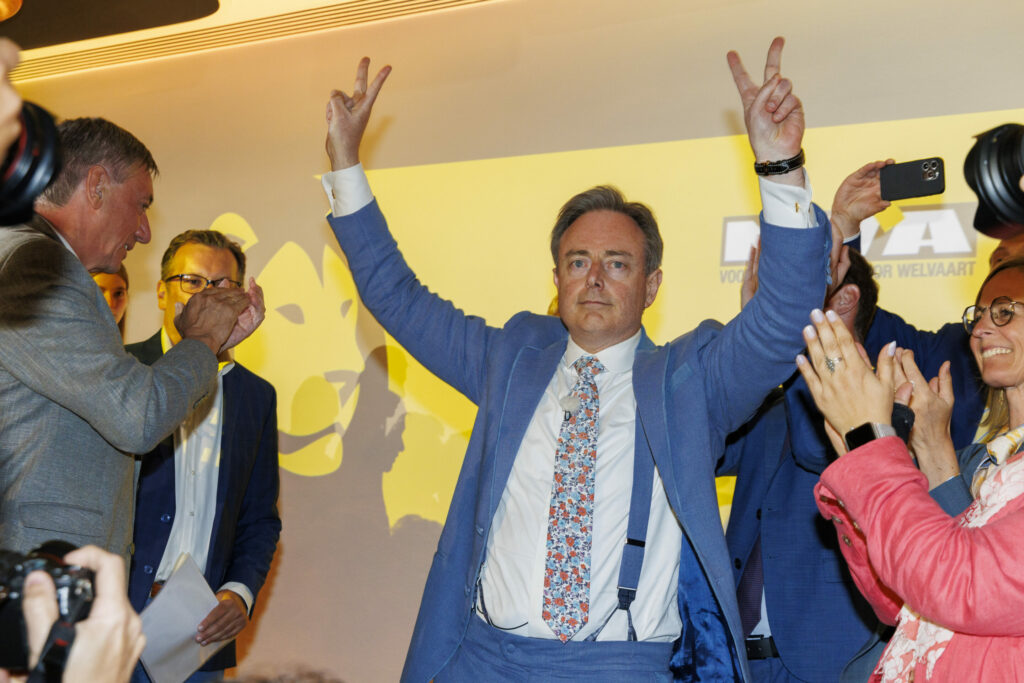
N-VA leader Bart De Wever delivers a speech at the post-election meeting of the Flemish nationalist party N-VA. Credit: Belga/Nicolas Maeterlinck
[09:11] – Over a million abstentions
Belgium saw a record number of electoral abstentions on Sunday, with over 1.05 million voters (12.5% of the electorate) shunning the polls. This is an increase of 100,000 since 2019.
In a sense, non-voters now represent the country's second-largest party: only slightly trailing behind the Flemish right-wing N-VA, which earned the support of 1.165 million voters.
The number of people who voted blank is slightly lower than five years ago: there were 415,912 blank votes (down from 438,098 in 2019). Likely, this is partially to do with the Blanco Party, which wants blank voting to lead to empty seats in parliament. The pioneering party received some 75,000 votes nationwide.
Although voting is compulsory in Belgium, abstaining is subject only to theoretical fines; prosecutions are extremely rare as legal authorities have other priorities.

